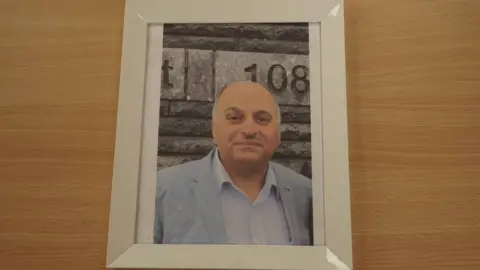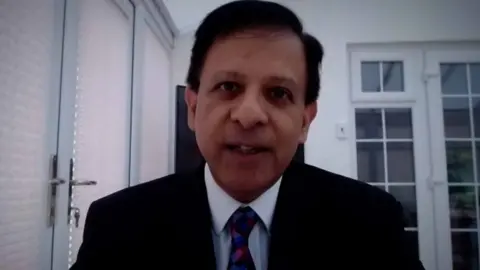Coronavirus: BAME doctors feel 'let down' over risk checks
 BBC
BBCEthnic minority doctors in the NHS feel "let down" by delays in work to ensure they are protected from coronavirus, the British Medical Association says.
The doctors' union warns many have not had promised risk assessments and redeployment opportunities.
Dr Chaand Nagpaul, BMA Council chairman, said it was "critical" action was taken to protect black, Asian and minority ethnic (BAME) doctors.
The NHS said BAME staff should get risk assessments at their place of work.
Hospital trusts and other health service bodies have been asked to prioritise risk assessments for BAME staff and other vulnerable groups, NHS England said.
At the end of April, NHS England recommended that ethnic minority healthcare workers should be risk-assessed for coronavirus. Scotland, Wales and Northern Ireland issued similar guidance.
But BBC research has found that hundreds of doctors still have not had a risk assessment.
In the last two weeks, BBC News has contacted medics via 25 groups representing ethnic minority doctors in the UK and asked a range of questions about risk assessments.
More than 1,600 doctors responded, with 1,040 saying they had not yet had a risk assessment.
Of 704 doctors who answered a question about their personal risk level, 408 said they were at either a high or moderate risk from coronavirus.

The BMA says that 33 of the hospital doctors and GPs who have died after testing positive for coronavirus - the vast majority - have come from BAME backgrounds.
Dr Nagpaul said protection for staff had to be improved.
"The feedback we're getting is that large numbers of BAME doctors do feel let down, they feel they haven't been given timely information, and been given the right assessment, and they haven't been given the right opportunities for redeployment.
"Risk assessments should have been in place for weeks, so that hospitals and GP practices could identify high-risk individuals to allow them to do different sorts of work to protect themselves from serious infection.
"It's really important that this is now done as a matter of priority."
'Still where we were'
There is currently no standardised framework for assessing a doctor's risk from coronavirus.
But a group of GPs in Manchester has designed a risk-assessment scorecard to help doctors do their jobs safely.
The Safety Assessment And Decision Scorecard (Saad) is named after Dr Saad al-Dubbaisi, a GP in Bury, who died after testing positive for coronavirus in May.
It's based on a scoring system that evaluates a doctor's risk based on a number of factors such as ethnicity, age, gender, body mass index (BMI), vitamin D levels and medical conditions.
Dr Mo Jiva, one of Saad's creators, said communication from NHS England about risk assessments had not been clear enough.
"I think we're still where we were weeks ago - NHS England is still churning the same information out.
"Time after time we've felt that issues highlighted to NHS England haven't been addressed.
"We started with masks that were well out of date, that were rebranded with a later expiry date, we've been talking about carrying out more telephone and video consultations, and staff wearing masks - it just appears that NHS England guidance seems to be three to four weeks behind the practical suggestions that are being proposed."
A spokesman for NHS England said: "Covid-19 has put an unprecedented spotlight on the health inequalities in our society, and is further evidence for why NHS organisations and trusts were asked to prioritise and carry out risk assessments for their black and minority ethnic staff and other vulnerable groups as a priority."

- 40,000 DEATHS: Could they have been prevented?
- TESTING: Who can get a test and how?
- LOOK-UP TOOL: How many cases in your area?
- EUROPE LOCKDOWN: How is it being lifted?
- TWO METRES: Could less than 2m work?
- THE R NUMBER: What it means and why it matters

